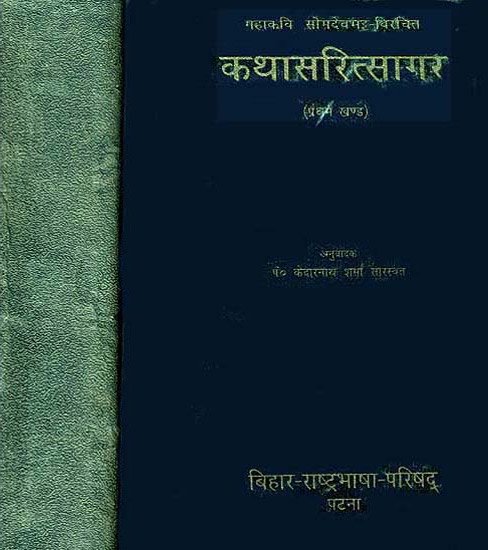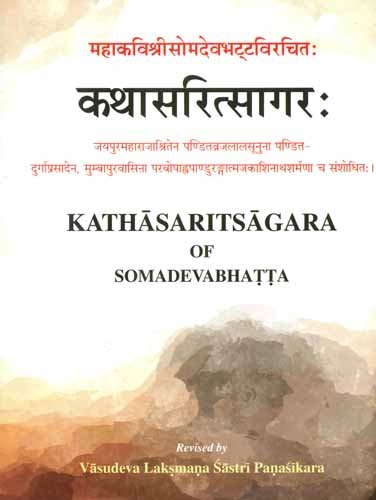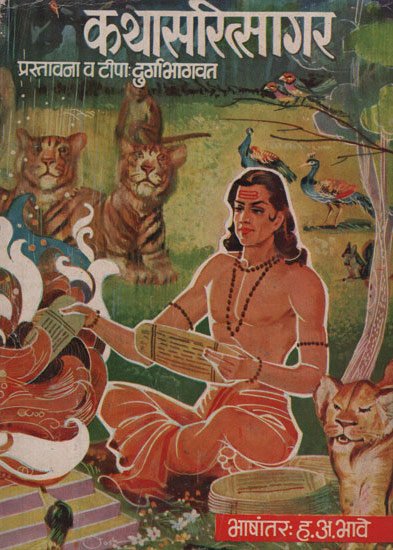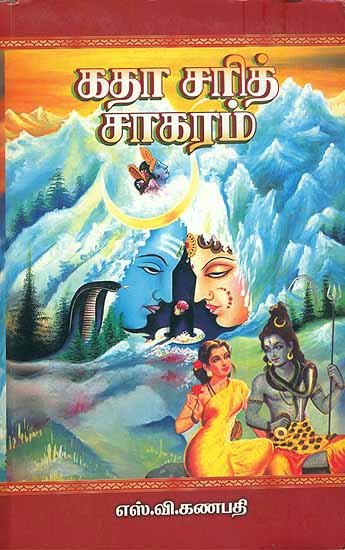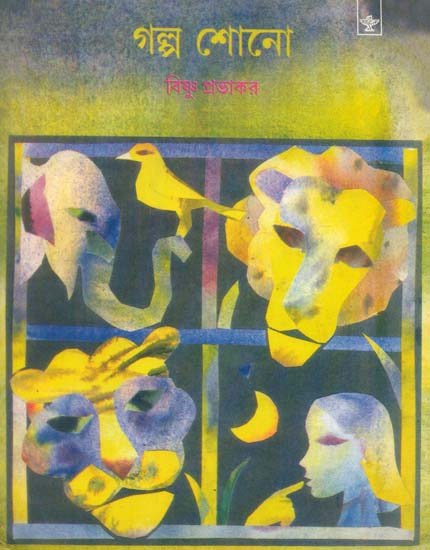Kathasaritsagara [sanskrit]
by C. H. Tawney | 2014 | 226,424 words | ISBN-13: 9789350501351
The Sanskrit edition of the Kathasaritsagara referencing the English translation and grammatical analysis. Written by Somadeva and dating from the 12th century, the Kathasaritsagara (or Katha-sarit-sagara) represents an epic legend narrating the adventures of Naravahanadatta as he strives to become the destined emperor of the Vidyadharas. Alternative titles: (Kathāsaritsāgara, कथासरित्सागर, Kathā-sarit-sāgara)
Verse 15.2.140
आह्वातव्याः पुनरवसरे पुत्र भूयो वयं ते जन्मन्येतत्फलमिह हि नस्त्वन्मुखेन्दुं यदेतम् ।
चक्षुःपेयामृतरसमयं कान्तमालोकयामो दिव्यां लक्ष्मी यदपि भवतो वीक्ष्य मोदामहे च ॥ १४० ॥
āhvātavyāḥ punaravasare putra bhūyo vayaṃ te janmanyetatphalamiha hi nastvanmukhenduṃ yadetam |
cakṣuḥpeyāmṛtarasamayaṃ kāntamālokayāmo divyāṃ lakṣmī yadapi bhavato vīkṣya modāmahe ca || 140 ||
The English translation of Kathasaritsagara Verse 15.2.140 is contained in the book The Ocean of Story by C.H. Tawney. This book is available online or you could buy the latest edition:
Read online Buy now! The English translation by C.H. Tawney (2014)
Glossary of Sanskrit terms
Note: This extracts Sanskrit terms and links to English definitions from the glossary, based on an experimental segmentation of verse (15.2.140). Some terms could be superfluous while some might not be mentioned. Click on the word to show English definitions.
Ahva, Avi, Avya, Punar, Avasare, Avasara, Putra, Bhuyah, Bhuyas, Vaya, Asmad, Tad, Yushmad, Janman, Etad, Phala, Iha, Mukhendu, Yada, Yad, Ita, Cakshu, Cakshus, Peya, Rita, Rasamaya, Kantamala, Uka, Yama, Divi, Divya, Lakshmi, Yat, Api, Bhavat, Bhavant, Vikshya,
Analysis of Sanskrit grammar
Note: this is an experimental feature and only shows the first possible analysis of the Sanskrit text (Kathasaritsagara Verse 15.2.140). If the system was successful in segmenting the sentence, you will see of which words it is made up of, generally consisting of Nouns, Pronouns, Verbs, Participles and Indeclinables. Click on the link to show all possible derivations of the word.
- Line 1: “āhvātavyāḥ punaravasare putra bhūyo vayaṃ te janmanyetatphalamiha hi nastvanmukhenduṃ yadetam ”
- āhvāt -
-
āhva (noun, masculine)[adverb], [ablative single]āhva (noun, neuter)[adverb], [ablative single]
- avyāḥ -
-
avi (noun, feminine)[ablative single], [genitive single]avī (noun, feminine)[ablative single], [genitive single]avya (noun, masculine)[nominative plural], [vocative plural]avyā (noun, feminine)[nominative plural], [vocative plural], [accusative plural]√u -> avya (participle, masculine)[nominative plural from √u class 1 verb], [vocative plural from √u class 1 verb], [nominative plural from √u class 2 verb], [vocative plural from √u class 2 verb], [nominative plural from √u class 5 verb], [vocative plural from √u class 5 verb]√u -> avyā (participle, feminine)[nominative plural from √u class 1 verb], [vocative plural from √u class 1 verb], [accusative plural from √u class 1 verb], [nominative plural from √u class 2 verb], [vocative plural from √u class 2 verb], [accusative plural from √u class 2 verb], [nominative plural from √u class 5 verb], [vocative plural from √u class 5 verb], [accusative plural from √u class 5 verb]
- punar -
-
punar (indeclinable adverb)[indeclinable adverb]punar (indeclinable)[indeclinable]
- avasare -
-
avasare (indeclinable)[indeclinable]avasara (noun, masculine)[locative single]
- putra -
-
putra (noun, masculine)[compound], [vocative single]putra (noun, neuter)[compound], [vocative single]
- bhūyo* -
-
bhūyaḥ (indeclinable)[indeclinable]bhūyas (noun, masculine)[compound], [adverb]bhūyas (noun, neuter)[compound], [adverb], [nominative single], [vocative single], [accusative single]
- vayam -
-
vaya (noun, masculine)[adverb], [accusative single]vayā (noun, feminine)[adverb]asmad (pronoun, none)[nominative dual]
- te -
-
ta (noun, masculine)[locative single]ta (noun, neuter)[nominative dual], [vocative dual], [accusative dual], [locative single]tā (noun, feminine)[nominative dual], [vocative single], [vocative dual], [accusative dual]tad (noun, neuter)[nominative dual], [accusative dual]sa (noun, masculine)[nominative plural]sā (noun, feminine)[nominative dual], [accusative dual]yuṣmad (pronoun, none)[dative single], [genitive single]
- janmanye -
-
janman (noun, neuter)[nominative dual], [vocative dual], [accusative dual], [locative single]
- etat -
-
etad (noun, masculine)[compound], [adverb], [nominative single], [vocative single]etad (noun, neuter)[compound], [nominative single], [accusative single]
- phalam -
-
phala (noun, masculine)[adverb], [accusative single]phala (noun, neuter)[adverb], [nominative single], [accusative single]phalā (noun, feminine)[adverb]
- iha -
-
iha (indeclinable adverb)[indeclinable adverb]iha (indeclinable)[indeclinable]
- hi -
-
hi (indeclinable particle)[indeclinable particle]
- nas -
-
na (noun, masculine)[nominative single]asmad (pronoun, none)[accusative plural], [dative plural], [genitive plural]
- tvan -
-
yuṣmad (pronoun, none)[ablative single]
- mukhendum -
-
mukhendu (noun, masculine)[accusative single]
- yade -
-
yadā (indeclinable adverb)[indeclinable adverb]yadā (indeclinable relative)[indeclinable relative]yadā (indeclinable)[indeclinable]yad (noun, masculine)[instrumental single], [dative single]
- itam -
-
ita (noun, masculine)[adverb], [accusative single]ita (noun, neuter)[adverb], [nominative single], [accusative single]itā (noun, feminine)[adverb]√i -> ita (participle, masculine)[accusative single from √i class 2 verb]√i -> ita (participle, neuter)[nominative single from √i class 2 verb], [accusative single from √i class 2 verb]√i (verb class 2)[imperative active second dual]
- Line 2: “cakṣuḥpeyāmṛtarasamayaṃ kāntamālokayāmo divyāṃ lakṣmī yadapi bhavato vīkṣya modāmahe ca ”
- cakṣuḥ -
-
cakṣus (noun, masculine)[compound], [adverb], [nominative single], [vocative single]cakṣus (noun, neuter)[compound], [adverb], [nominative single], [vocative single], [accusative single]cakṣu (noun, masculine)[nominative single]√kṣai (verb class 1)[perfect active third plural]
- peyām -
-
peyā (noun, feminine)[accusative single]√pā -> peyā (participle, feminine)[accusative single from √pā class 1 verb], [accusative single from √pā class 2 verb]√pā -> peyā (participle, feminine)[accusative single from √pā class 2 verb]√pā -> peyā (participle, feminine)[accusative single from √pā class 3 verb]√pai -> peyā (participle, feminine)[accusative single from √pai class 1 verb]√pi -> peyā (participle, feminine)[accusative single from √pi class 6 verb]√pi -> peyā (participle, feminine)[accusative single from √pi class 1 verb], [accusative single from √pi class 2 verb], [accusative single from √pi class 3 verb]√pī -> peyā (participle, feminine)[accusative single from √pī class 1 verb], [accusative single from √pī class 2 verb], [accusative single from √pī class 3 verb], [accusative single from √pī class 4 verb]
- ṛta -
-
ṛta (indeclinable adverb)[indeclinable adverb]ṛta (noun, masculine)[compound], [vocative single]ṛta (noun, neuter)[compound], [vocative single]
- rasamayam -
-
rasamaya (noun, masculine)[adverb], [accusative single]rasamaya (noun, neuter)[adverb], [nominative single], [accusative single]
- kāntamālo -
-
kāntamālā (noun, feminine)[nominative single]
- uka -
-
uka (indeclinable)[indeclinable]
- yāmo* -
-
yāma (noun, masculine)[nominative single]√yā (verb class 2)[present active first plural]
- divyām -
-
divī (noun, feminine)[locative single]divyā (noun, feminine)[accusative single]
- lakṣmī -
-
lakṣmī (noun, feminine)[compound], [nominative single]
- yad -
-
yat (indeclinable relative)[indeclinable relative]yat (noun, masculine)[compound]yad (noun, masculine)[compound], [adverb], [nominative single], [vocative single]yat (noun, neuter)[nominative single], [vocative single], [accusative single]√i -> yat (participle, neuter)[nominative single from √i class 2 verb], [vocative single from √i class 2 verb], [accusative single from √i class 2 verb]yat (pronoun, neuter)[nominative single], [accusative single]
- api -
-
api (indeclinable preposition)[indeclinable preposition]ap (noun, neuter)[locative single]api (Preverb)[Preverb]
- bhavato* -
-
bhavat (noun, masculine)[accusative plural], [ablative single], [genitive single]bhavat (noun, neuter)[ablative single], [genitive single]bhavant (pronoun, masculine)[accusative plural], [ablative single], [genitive single]bhavant (pronoun, neuter)[ablative single], [genitive single]√bhū (verb class 1)[present active third dual]
- vīkṣya -
-
vīkṣya (noun, masculine)[compound], [vocative single]vīkṣya (noun, neuter)[compound], [vocative single]
- modāmahe -
-
√mud (verb class 1)[present middle first plural]
- ca -
-
ca (indeclinable conjunction)[indeclinable conjunction]ca (noun, masculine)[compound], [vocative single]ca (noun, neuter)[compound], [vocative single]
Other editions:
Also see the following editions of the Sanskrit text or (alternative) English translations of the Kathasaritsagara Verse 15.2.140
Kathasaritsagar
by Kedarnath Sharma Saraswat (2005)
The Only Edition with the Sanskrit Text and its Hindi Translation (An Old and Rare Book) Set of 3 Vol.
Buy now!
Kathasaritsagara of Somadeva Bhatta (Sanskrit Text Only)
by Vasudeva Laksmana Sastri (2013)
Katha Sarit Sagar in Marathi
by H. A Bhave (1995)
Set of 5 Volumes; Published by Varada Books, Pune. 2256 pages (Throughout B/W Illustrations).
Buy now!
Katha Sarit Sagara (Tamil)
by S. V. Ganapati (எஸ். வி. கணபதி) (2014)
[கதா சரித் சாகரம்] Published by Alliance Publications.
Buy now!
Galpa Shono
by Abhijit Chattopadhyay (2014)
[গল্প শোনো] Galpa Shono: Bengali Translation of 'Suno Kahani From Katha Sarit Sagar'; 9788126015436; Published by Sahitya Akademi, Delhi.
Buy now!Preview of verse 15.2.140 in Bengali sript:
আহ্বাতব্যাঃ পুনরবসরে পুত্র ভূযো বযং তে জন্মন্যেতত্ফলমিহ হি নস্ত্বন্মুখেন্দুং যদেতম্ ।
চক্ষুঃপেযামৃতরসমযং কান্তমালোকযামো দিব্যাং লক্ষ্মী যদপি ভবতো বীক্ষ্য মোদামহে চ ॥ ১৪০ ॥
![Kathasaritsagara [sanskrit] - book cover](/uploads/a/Katha-Sarit-Sagara.jpg)
